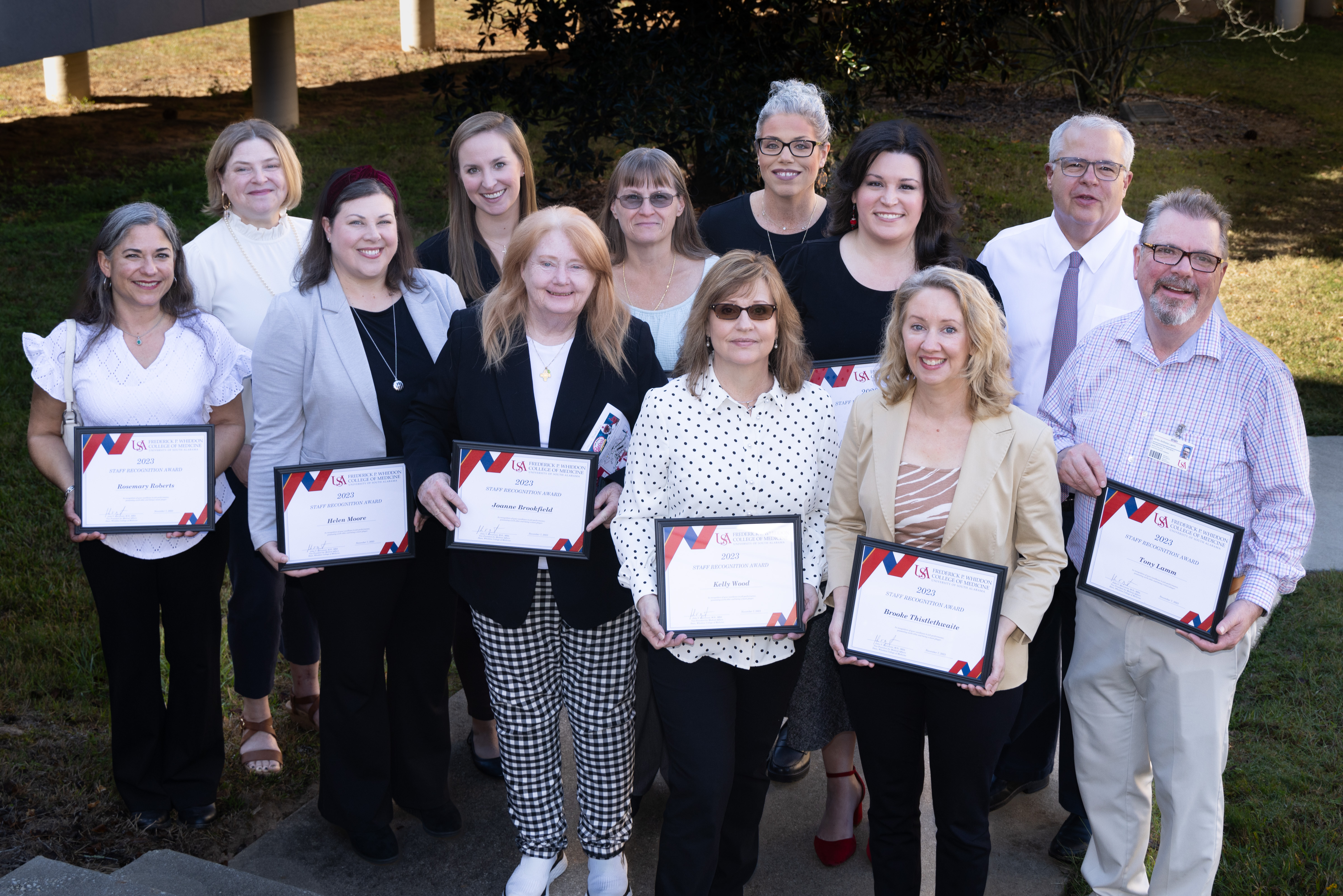 |
| Researchers leading the study, from left, are Kunwar Somesh Vikramdeo, Ph.D., Ajay Singh, Ph.D., Santanu Dasgupta, Ph.D., and Shashi Anand, Ph.D. |
Early detection and effective treatment of triple-negative breast cancer (TNBC) are the ultimate goals of a study by researchers at the USA Health Mitchell Cancer Institute and the Frederick P. Whiddon College of Medicine.
The research is a collaborative endeavor from the laboratory of Ajay Singh, Ph.D., leader of the Cancer Biology Program at the Mitchell Cancer Institute and a professor of pathology at the Whiddon College of Medicine, and Santanu Dasgupta, Ph.D., a cancer researcher at the Mitchell Cancer Institute and an assistant professor of pathology at the Whiddon College of Medicine.
Upon diagnosis, breast cancer is divided into different molecular subtypes based on the expression of estrogen and progesterone receptors and HER2, a growth factor receptor that is known to fuel breast cancer growth. If the cancer cells test negative for these three receptor proteins, it is categorized as triple-negative breast cancer that relies on yet uncharacterized growth pathways.
TNBC accounts for 10% to 15% of all breast cancers. This aggressive type of cancer grows and spreads more rapidly and is more likely to return after treatment than other types of breast cancer. These cancers tend to be more common in women younger than age 40 or who have a BRCA1 gene mutation. Black women also have a higher risk of developing TNBC.
Treatment options for TNBC are limited compared to other molecular subtypes for which receptor-targeted therapies are available. Researchers at the Mitchell Cancer Institute and the Whiddon College of Medicine aim to find novel therapeutic vulnerabilities for this aggressive subtype as well as develop tools for earlier diagnosis at a localized stage. In their recent efforts, they measured changes in mitochondrial DNA in tumors and circulating extracellular vesicles from women with a primary diagnosis of metastatic triple-negative breast cancer. Mitochondria plays a role in fulfilling the energy demand of the cells, and cancer cells often exhibit mutations in their mitochondrial DNA.
 |
Postdoctoral researchers Kunwar Somesh Vikramdeo, Ph.D., left, and Shashi Anand, Ph.D., are lead authors of the study. |
“The broader vision and mission of our study is to develop a minimally invasive blood test kit for early diagnostics, monitoring, and guiding therapeutic planning of triple-negative breast cancer patients,” Dasgupta said.
Published in FASEB BioAdvances, a journal of the Federation of American Societies for Experimental Biology, this is the first study to catalog metastatic tumor-signature mitochondrial DNA mutations in TNBC patients and then trace the tumor-signature mutations in the circulating extracellular vesicles of the same patients with high sensitivity and specificity. Notably, the majority of the hotspot mitochondrial DNA mutations detected in the TNBC patients were also detected in the circulating extracellular vesicles of highly aggressive pancreatic cancer patients, as found in a 2022 study conducted by the Singh and Dasgupta team.
“These findings are very encouraging and implicate the role of these mutations in driving human tumorigenesis,” said Kunwar Somesh Vikramdeo, Ph.D., a postdoctoral researcher and one of the lead authors of the study.
In addition to the mutational events, the team found unique abundances of mitochondrial DNA and cardiolipin contents (an inner mitochondrial membrane lipid) in the extracellular vesicles of these TNBC patients.
“Thus, measuring tumor-signature mitochondrial DNA alterations in concert with cardiolipin contents in the circulating extracellular vesicles could be useful to formulate a minimally invasive method for early cancer detection and monitoring using a small amount of blood samples,” said Shashi Anand, Ph.D., a postdoctoral researcher and one of the lead authors of the study.
Based on these findings from the Singh and Dasgupta laboratories, the University of South Alabama has submitted a non-provisional patent application for the development of a novel mitochondrial DNA detection platform using blood samples from patients. The researchers are currently seeking funding support and collecting blood samples from a larger number of cancer patients to test the panel of mitochondrial markers that were developed in their laboratories.
“Mitochondrial DNA mutations are detectable in the circulation and are frequent in human cancers, likely promoting aggressive tumor growth,” Singh said. “We want to exploit these observations to develop ways to detect cancer early and even predict its nature for improved therapeutic management and enhance patients’ survival.”
The work is supported by funding from the Breast Cancer Research Foundation of Alabama, the Mitchell Cancer Institute, and the University of South Alabama. Additional authors from the Mitchell Cancer Institute and the Whiddon College of Medicine are Sarabjeet Kour Sudan, Ph.D.; Paramahansa Pramanik, Ph.D.; and Seema Singh, Ph.D. Andrew K. Godwin, Ph.D., a professor of cancer biology, laboratory medicine, pathology, microbiology, molecular genetics, and immunology, is a co-author and collaborator from the University of Kansas Medical Center.
Read the full article in FASEB BioAdvances.


































